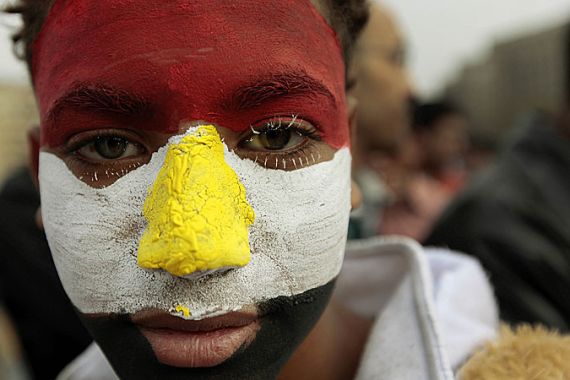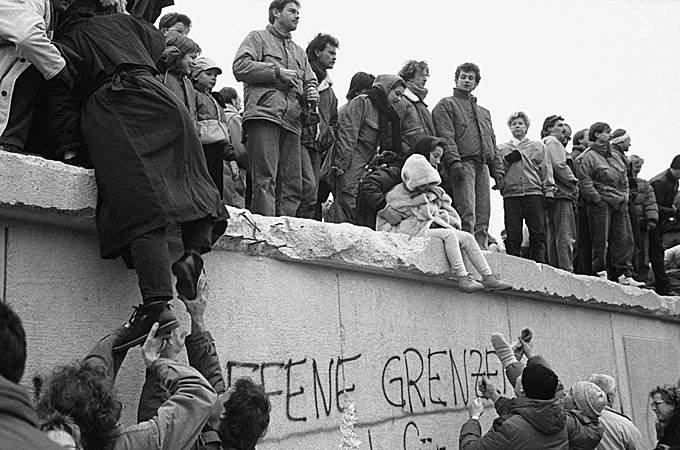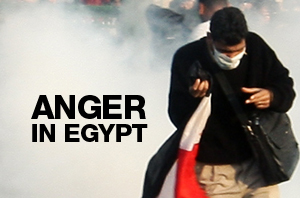The Arab world’s 1989 revolution?
As protests sweep Arab nations and reach fever pitch in Egypt, are we seeing a revolution of Soviet bloc proportions?

 |
| The fall of the Berlin Wall symbolised the end of oppressive communist regimes across eastern Europe [GALLO/GETTY] |
Days of mass protests in Egypt have escalated dramatically with estimates of one million people descending on Tahrir square in central Cairo, in a bid to oust the country’s long-term president.
Opposition groups are hoping that the numbers out on the streets will persuade Hosni Mubarak to realise that he no longer holds popular support in Egypt.
But the action in Egypt is being seen as part of a wider movement, a so-called “Arab revolution”, following a wave of protests in Tunisia, Lebanon and Yemen.
In Jordan on Tuesday King Abdullah sacked his government in the wake of demonstrations there.
The ripple effect, described by one commentator as the “wave of democracy finally crashing on the North African shore”, has led to comparisons with the protest movement across Eastern Europe in 1989 that spelt the demise of communism and eventually the Soviet Union.
Demand for reform
When Polish people voted in their first free elections more than two decades ago and formed the Soviet bloc’s first non-communist government, it helped spark a chain of events across the region.
Hungary also played an early role, abolishing the people’s republic and cutting down its fortified border with Austria, allowing hundreds of East Germans to cross through.
Two revolutions swiftly followed in Czechoslovakia and Romania. The “Velvet Revolution” in November 1989 saw hundreds of thousands of peaceful protesters take to the streets in Prague until the Communist party was dissolved to make way for democracy.
Opposition movements in Romania saw a more bloody end, with the president Nicolae Ceausescu and his wife Elena shot by firing squad following 10 days of violent protest.
|
The year’s events were epitomised by the collapse of the Berlin Wall, a symbol of oppression to many, and over the next two years, communist regimes fell in the Balkans and the Soviet Union.
While the situation in Egypt and other Arab nations is far from over, experts and commentators have drawn some parallels between the two eras.
“The way they started – the demand for reform, democracy and the mass protests in terms of sweeping movements – are similar characteristics,” Tony Saunois, secretary of the Committee for Workers International based in London, told Al Jazeera.
A number of other factors, including the failure of government to keep spirits up amid economic hardship, can also be compared with what happened in eastern Europe when people realised the new system was not working, Edward Lucas, author of The New Cold War and international editor of The Economist, said.
“The regimes lost their soft power – it’s not more fun, or prosperous, under their rule,” he told Al Jazeera.
Another parallel is that “the climate of fear has ebbed and people no longer believe that the regime is willing to kill”.
Lack of a superpower
But while some point to the domino effect that spread across eastern Europe as being similar to the way protests and uprising are moving across the Arab world, there are also some distinct differences.
“In 1989 there was an implosion of a social system that was based on a centralised system. The Arab world doesn’t have that,” Saunois says.
“They do have state control in terms of political oppression, but … the social basis they rest on, capitalism, is different.
“The international consequences of 1989 were also different. One of them was the pushing back of Socialism – that’s not going to be replicated by the movement in the Arab world when you’ve got a world economic recession.”
With the situation still open in Egypt, there are also questions as to what political movement will emerge as the strongest once, if and when, Mubarak bows out as leader.
George Joffe, lecturer at the Centre for International Studies at Cambridge University, says no one yet knows what the future holds for Arab states.
“In the Arab world there’s an underlay of commonality about what’s happening, but it’s a sociological one rather than a political one,” he told Al Jazeera.
|
“The real demand of the people is simple – to be free of oppression. But what’s not clear is if they can agree on what the future can be” George Joffe |
“We are not seeing any ideology destroyed, and in the Arab world there’s not one ideology, there’s many.”
He said many former Soviet states were quick to install democractic adminstrations partly because some had previously held them, such as Czechoslovakia, but also because they were part of the wider “European experience”.
“But it’s interesting to note that when you moved further east, to Belarus, to Russia, then there wasn’t such enthusiam for the democratic model.”
Joffe adds a word of caution when comparing the situation of 1989 to the present Arab revolt, because “each country is separate”, with different relations between the military, the government and opposition groups.
“The real demand of the people is simple – to be free of oppression. But what’s not clear is if clear is if they can agree on what the future can be.
“We’re standing at a very uncertain moment. There’s going to be change. No regime is going to be able to engage in the kind of oppression that we’ve seen before. But it doesn’t mean we won’t still see more autocratic regimes in the future.”
Some media outlets have highlighted concern that the uprising in Egypt could pave the way for an Iranian-style Islamic movement to seize power, but it is a suggestion quickly squashed by academics.
Omar Ashour, a lecturer in Arab politics at the University of Exeter in Britain, told Al Jazeera “the main group of persons in Egypt are young men who are disenchanted, who are pushing for a democratic society”.
“Most of the ones leading the Islamic groups are less well organised but they don’t want to confront the government and they did not support this revolution in the beginning.
“So even if they took power, we might more or less see something that is similar to Turkey rather than Iran.”
‘End to tyranny’
Despite the differences, there are some lessons from history the Egyptian people may be willing to take home with them.
Lucas says protesters fighting for democracy across the Arab world should beware the “shape-shifting of clever people in the regime”.
“A lot of old communists came back in old guises – if you look around eastern Europe now many people in power had careers that flourished in the communist era,” he said, adding that the old KGB used their connections and influence to regain power under the new regime.
Another lesson to be learnt from history, he said, is that “revolution doesn’t always mean democracy”, as illustrated by uprisings in Central Asia and Azerbaijan.
But Ashour is more optimistic.
“We are seeing already Al Jazeera has been cut from the Arab world that shows how fragile the situation is.
“I think this will be the beginning of the Arab spring and the end of an ugly era of brutality and tyranny,” he said.
